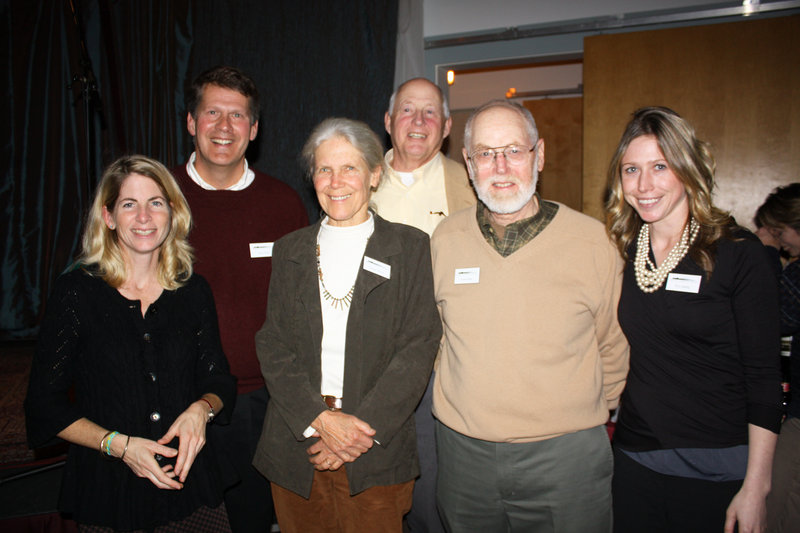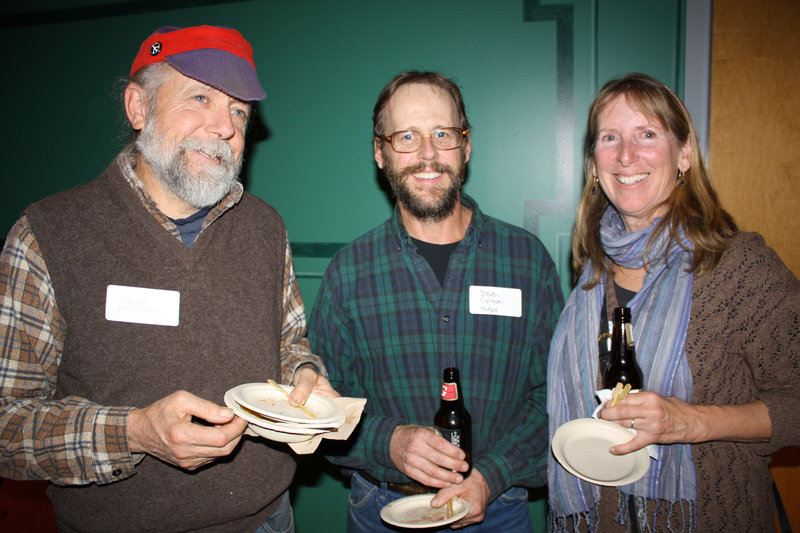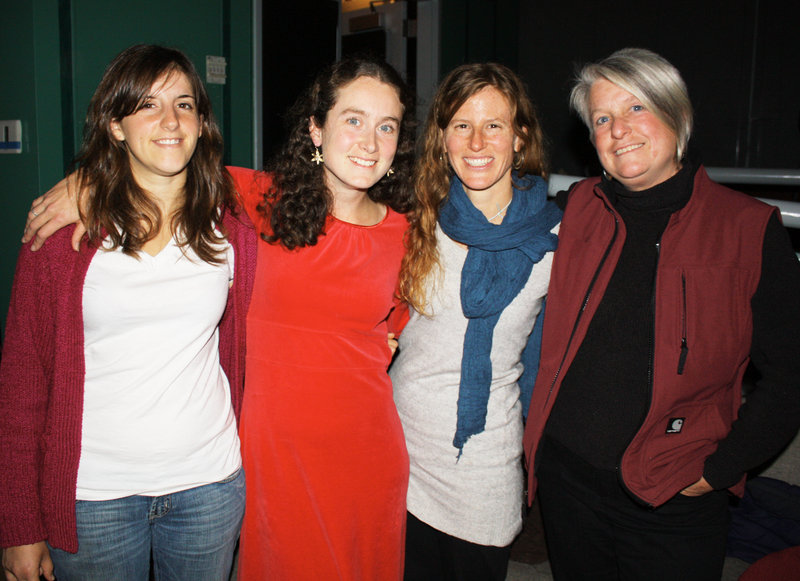The renaissance sweeping through Maine’s agricultural sector was hard to miss Wednesday night, when Maine Farmland Trust held its annual celebration for members at One Longfellow Square in Portland. The farm conservation organization’s party attracted 125 people, which was a great turnout considering this was the first time the Belfast-based nonprofit held its annual meeting in Maine’s largest city.
Guests enjoyed beer and wine, along with soup, salad and finger foods prepared by Local Sprouts Cooperative Cafe and music from Dog Wants Out. The party also offered a last chance to see select scenes from the “Of Farms and Fables” theatrical production created by Open Water Theatre Arts.
Maine Farmland Trust is in the midst of an ambitious campaign to protect 100,000 acres of the state’s farmland by 2014. So far, the organization has protected 26,382 acres, which leaves more than 73,000 acres to go.
“There are so many people who are just passionate about what we do,” Executive Director John Piotti told me. “There’s been such a change from three or four years ago. People have seen the fruits of what we’ve built over the past 15 years.”
When he addressed the full crowd, he elaborated on this idea, telling us that five years ago Maine Farmland Trust had 300 members. Today the nonprofit counts 3,400 households as members.
“Sixteen years ago the challenges were different,” Piotti said. “Local farmers couldn’t find a market. Now, there’s a huge demand for local products.”
Today’s biggest challenge is finding properties that existing and aspiring farmers can afford to buy. Compounding the problem is the fact that a third of the state’s farmland is projected to be in transition in the next five years, as Maine’s farmers continue to age and retire from farming.
“If we don’t take some serious action, we’re going to lose a resource base,” Piotti said. “One hundred thousand acres is a good chunk of the land that’s vulnerable.”
In order to protect this much land, Maine Farmland Trust needs to raise $50 million. Of that amount, the organization hopes $10 million will come from individuals, which will allow it to seek the rest from grants and other funding sources. So far, $6.3 million has been raised toward the $10 million goal.
The best part, Piotti told us, is if Maine Farmland Trust succeeds in protecting and keeping 100,000 acres as active farmland, that land will generate $50 million worth of economic activity every year.
“If you don’t have the land, you can’t rebuild the local food base,” board member Eleanor Kinney told me.
Kinney is active with the Slow Money Maine movement, which seeks to redirect capital investments into community-based food and farming enterprises. Citing the growing national interest in Slow Money along with the expanding market for locally produced food, Kinney told me: “The whole story about what’s happening in agriculture is a positive story for Maine. There’s a lot of opportunity.”
Staff member Nina Young, who works to acquire farm conservation easements, said there are many older farmers who’d like to pass their land onto their children to keep it as a working farm, but cannot afford to do so.
“These farms are very vulnerable to going out of business,” Young told me.
Working farm conservations easements can be a solution that eases property tax burdens and reduces the sale price of farmland.
“If we don’t protect it, we’re going to lose it,” board member Frank Miles told me.
Dave Colson, who runs New Leaf Farm in Freeport with his wife, Chris Colson, told me about how much the agriculture scene in Maine has evolved since the farm was established in 1982.
“At the time we first certified the farm (organic) in 1985, there were 14 other certified farms in the state,” said Colson, who also works as the agriculture services director for the Maine Organic Farmers and Gardeners Association. “Now there are more than 400 certified farms.”
Still, Colson said there is work to be done to make Maine’s farming sector more viable. One hurdle he sees is a lack of farming neighbors who can offer assistance, advice and support. Years ago this used to be the norm in much of the state, but not anymore.
Instead programs such as Maine Farmland Trust’s FarmLink, which connects owners of farmland with people looking to farm, and MOFGA’s Farmer to Farmer Conference help to fill the void left when farmers can no longer chat with a fellow agrarian across the fence.
“When the farms start going away, there’s no business left for the infrastructure,” John McIntire of Unity told me, referring to related businesses such as equipment dealers, feed suppliers and food processors. “But it’s coming back. We’ve hung onto enough of it.”
As he spoke to the crowd, Piotti said the growing support for Maine Farmland Trust reflects the public’s renewed understanding of the importance of local food.
“A lot of the credit stems from the fact that we’re doing the right thing at the right time,” Piotti said. “That resonates with people.”
Staff Writer Avery Yale Kamila can be contacted at 791-6297 or at: akamila@pressherald.com
Twitter: AveryYaleKamila
Send questions/comments to the editors.





Success. Please wait for the page to reload. If the page does not reload within 5 seconds, please refresh the page.
Enter your email and password to access comments.
Hi, to comment on stories you must . This profile is in addition to your subscription and website login.
Already have a commenting profile? .
Invalid username/password.
Please check your email to confirm and complete your registration.
Only subscribers are eligible to post comments. Please subscribe or login first for digital access. Here’s why.
Use the form below to reset your password. When you've submitted your account email, we will send an email with a reset code.